Parents
Mum Loves Me Now
Bile beans as a cure for parental neglect.
Posted By: Alex - Wed Feb 05, 2020 -
Comments (5)
Category: Advertising, Parents, 1950s
Mama Robot Device
In 2017, patent number KR20170003315A was granted to a Korean inventor for a "Mama Robot Device". The inventor's name is only given in Korean, so I'm not sure what it is, but Google translates it as Jeong In-pil.The Mama Robot is creepy in many ways. As far as I can tell, it's a device that allows children to punish themselves when they know they've been naughty but their parents are away.
The child is able to decide how many lashes with a cane they deserve, and the Mama Robot will then deliver the punishment. As it does so, the prerecorded voice of the parent will admonish the child, but simultaneously the Mama Robot will weep "such that the sad feelings of the parent punishing are conveyed to the child."
A camera inside Mama Robot will record the entire event and then send the video to the parent's phone, as proof that punishment has been served.
I wonder, how many years of therapy would it take for a child to recover from having Mama Robot installed in their home?

Posted By: Alex - Sun Dec 15, 2019 -
Comments (6)
Category: Inventions, Patents, Robots, Parents
Think of her as your mother
American Airlines ran this ad in magazines in 1968.
The ad became notorious enough to eventually attract the attention of academics. The following analysis comes from “‘Think of her as your mother’: Airline advertising and the stewardess in America, 1930-1980,” by Peter Lyth in The Journal of Transport History (Oct 2012):
It also inspired some copycats, such as this 1971 ad from Southwestern Bell:

However, not all American Airlines stewardesses appreciated the ad:

The Nashville Tennessean - Jun 29, 1968
Posted By: Alex - Thu Oct 03, 2019 -
Comments (4)
Category: Advertising, Parents, Air Travel and Airlines, 1960s
Parental Pressure
David Phillips was so eager to become a grandfather that in 1969 he built a 9-foot statue of a pregnant woman outside his house as a subtle hint to his son, Bill, and daughter-in-law that they should hurry up and start producing children.I found a picture of the statue under wraps, but unfortunately not one of it uncovered. Nor could I find out if Bill Phillips and his wife ever did succumb to the parental pressure and hade children. But I did find out that he was a minor celebrity as a trumpet player. You can read his bio on the Canadian Encyclopedia. He was a founding member of the band Canadian Brass. The bio also reports a rumor that he played the trumpet solo on Penny Lane, which he didn't, but apparently he was famous enough as a trumpet player that the idea seemed plausible to some people.

Great Falls Tribune - June 4, 1969
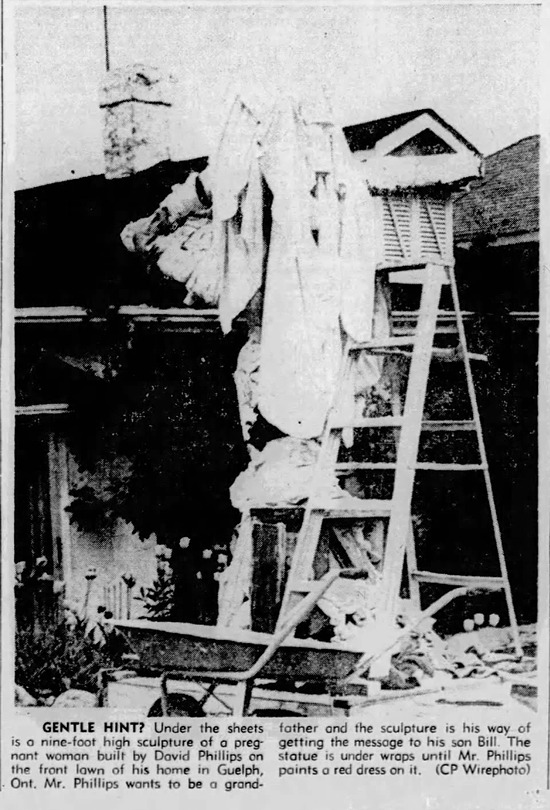
Calgary Herald - June 6, 1969
The trumpeter who actually played the solo on Penny Lane was David Mason. See video below.
Posted By: Alex - Tue Nov 27, 2018 -
Comments (1)
Category: Music, Parents, 1960s
Follies of the Madmen #378
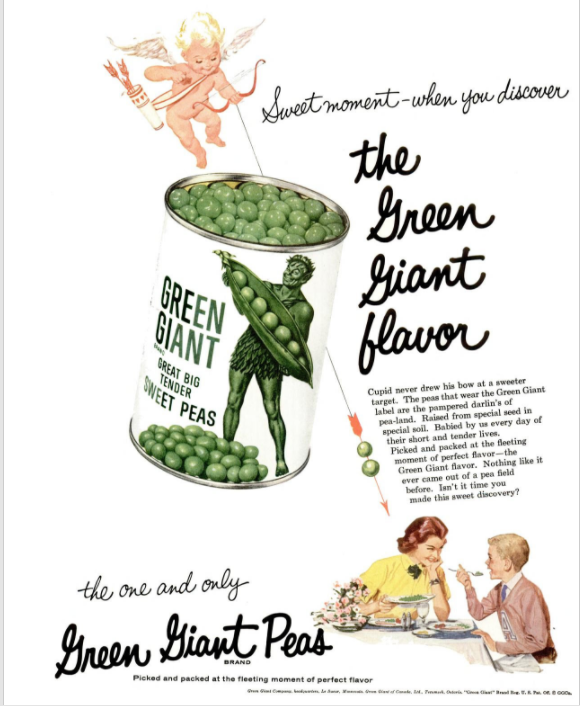
Cupid, traditionally the intermediary of erotic love, engenders a pea-based affection between mother and son.
Original ad here.
Posted By: Paul - Wed Aug 08, 2018 -
Comments (4)
Category: Business, Advertising, Food, Children, Parents, 1950s
Playful Swans

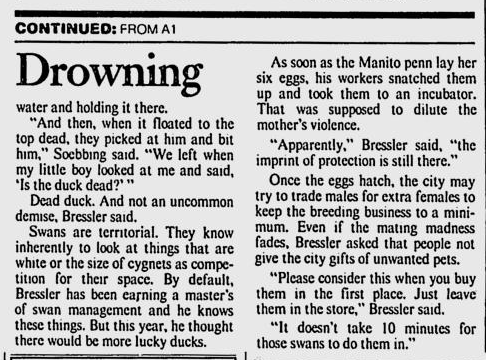
Original article here.
Posted By: Paul - Fri Mar 02, 2018 -
Comments (4)
Category: Animals, Death, Children, Parents, 1990s
Follies of the Madmen #352
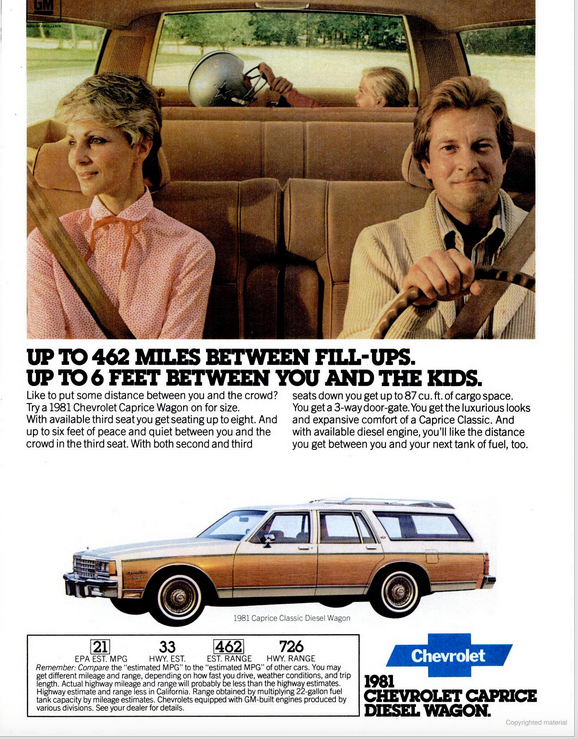
Put the noisy little brats in the unsafe cargo area, why not?
Source of ad.
Posted By: Paul - Mon Feb 19, 2018 -
Comments (12)
Category: Business, Advertising, Family, Children, Parents, 1980s, Cars
When Dad Does SFX for a Living
Posted By: Paul - Mon Dec 18, 2017 -
Comments (0)
Category: Children, Parents, Special Effects
Dawn Langley Simmons
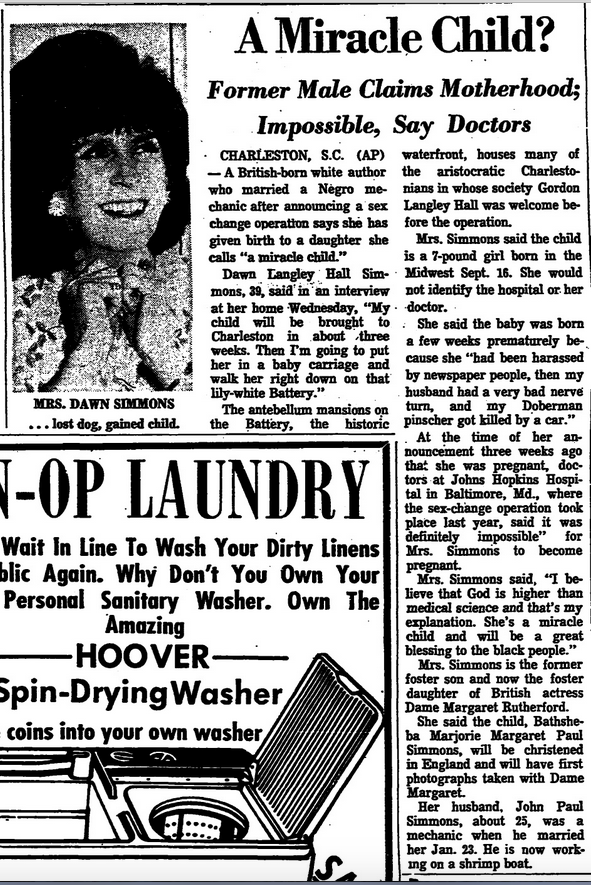
I believe every word that Dawn Langley Simmons says.
Source.
Posted By: Paul - Wed Sep 27, 2017 -
Comments (3)
Category: Children, Parents, 1960s, Gender-bending, LGBT
How many ways are children annoying?
Back in 1931, Dr. Mandel Sherman, director of the Child Research Centre, wanted to find out the exact number of ways in which children annoy their parents. He came up with the oddly specific number of 2,124 different ways.He arrived at this number by having a group of parents carry notebooks around with them for a week and record each time their child annoyed them.
Some of the ways in which the children annoyed: being disobedient, being too slow or too quick, not being neat, primping, etc.
Personally, I think he seriously lowballed that number.
We've encountered the work of Dr. Sherman before. Back in 2009, I posted about his advice that instead of training kids to be successful in life, we should train them to accept the inevitability of failure. That way, they'll be much happier when they actually do end up as mediocre flops.

The New York Times - Jan 30, 1931
Posted By: Alex - Mon Mar 20, 2017 -
Comments (3)
Category: Psychology, Children, Parents, 1930s

| Who We Are |
|---|
| Alex Boese Alex is the creator and curator of the Museum of Hoaxes. He's also the author of various weird, non-fiction, science-themed books such as Elephants on Acid and Psychedelic Apes. Paul Di Filippo Paul has been paid to put weird ideas into fictional form for over thirty years, in his career as a noted science fiction writer. He has recently begun blogging on many curious topics with three fellow writers at The Inferior 4+1. Contact Us |




